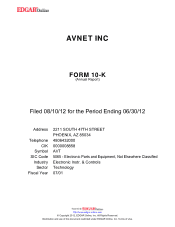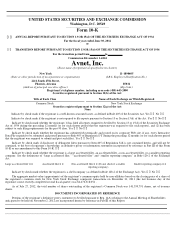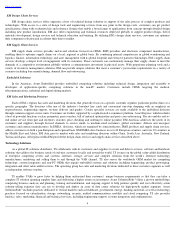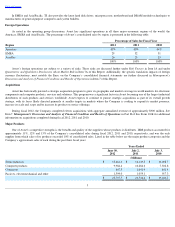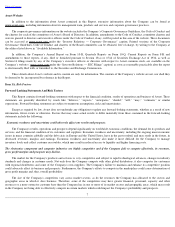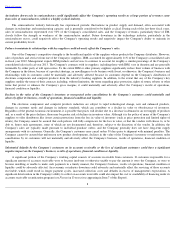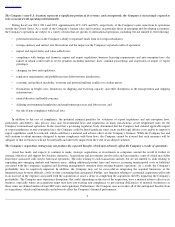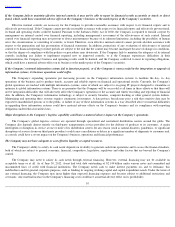Avnet 2012 Annual Report Download - page 10
Download and view the complete annual report
Please find page 10 of the 2012 Avnet annual report below. You can navigate through the pages in the report by either clicking on the pages listed below, or by using the keyword search tool below to find specific information within the annual report.
Table of Contents
The Company's non-
U.S. locations represent a significant portion of its revenue, and consequently, the Company is increasingly exposed to
risks associated with operating internationally.
During fiscal year 2012, 2011 and 2010, approximately 61%, 62% and 60%, respectively, of the Company's sales came from its operations
outside the United States. As a result of the Company's foreign sales and locations, in particular those in emerging and developing economies,
the Company's operations are subject to a variety of risks that are specific to international operations, including, but not limited to, the following:
In addition to the cost of compliance, the potential criminal penalties for violations of export regulations and anti-
corruption laws,
particularly anti-
bribery, data privacy laws and environmental laws and regulations in many jurisdictions, create heightened risks for the
Company's international operations. In the event that a governing regulatory body determined that the Company had violated applicable import
or export regulations or anti-
corruption laws, the Company could be fined significant sums, incur sizable legal defense costs and/or its import or
export capabilities could be restricted, which could have a material and adverse effect on the Company's business. While the Company has and
will continue to adopt measures designed to ensure compliance with these laws, the Company cannot be assured that such measures will be
adequate or that its business will not be materially and adversely impacted in the event of an alleged violation.
The Company's acquisition strategy may not produce the expected benefits, which may adversely affect the Company's results of operations.
Avnet has made, and expects to continue to make, strategic acquisitions or investments in companies around the world to further its
strategic objectives and support key business initiatives. Acquisitions and investments involve risks and uncertainties, some of which may differ
from those associated with Avnet's historical operations. The risks relating to such transactions include, but are not limited to, risks relating to
expanding into emerging markets and business areas, adding additional product lines and services, incurring unanticipated costs or liabilities
associated with the companies acquired and diverting management's attention from existing business operations. As a result, the Company's
profitability may be negatively impacted. In addition, the Company may not be successful in integrating the acquired businesses or the
integration may be more difficult, costly or time-
consuming than anticipated. Further, any litigation relating to a potential acquisition will result
in an increase in the expenses associated with the acquisition or cause a delay in completing the acquisition, thereby impacting the Company's
profitability. The Company may experience disruptions that could, depending on the size of the acquisition, have a material adverse effect on its
business, especially where an acquisition target may have pre-existing non-compliance or pre-
existing deficiencies or material weaknesses as
those terms are defined under relevant SEC rules and regulations. Furthermore, the Company may not realize all of the anticipated benefits from
its acquisitions, which could materially and adversely affect the Company's financial performance.
9
•
potential restrictions on the Company's ability to repatriate funds from its foreign subsidiaries;
•
foreign currency and interest rate fluctuations and the impact on the Company's reported results of operations;
• import and export duties and value-
added taxes;
• compliance with foreign and domestic import and export regulations, business licensing requirements and anti-
corruption laws, the
failure of which could result in severe penalties including monetary fines, criminal proceedings and suspension of import or export
privileges;
•
changing tax laws and regulations;
•
regulatory requirements and prohibitions that differ between jurisdictions;
•
economic and political instability, terrorism and potential military conflicts or civilian unrest;
•
fluctuations in freight costs, limitations on shipping and receiving capacity, and other disruptions in the transportation and shipping
infrastructure;
•
natural disasters and health concerns;
•
differing environmental regulations and employment practices and labor issues; and
• the risk of non-
compliance with local laws.

